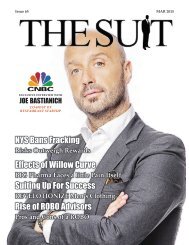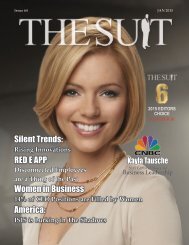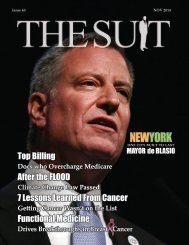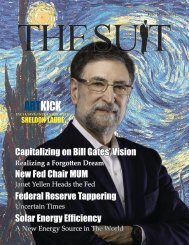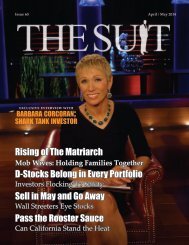o_19grqq7snim9mn019q11f7ds26a.pdf
Marcus Lemonis, a serial entrepreneur and host of the show “The Profit” on CNBC, is a true survivor in the corporate world. The native-born Lebanese business man endured the chaos of a civil war in Beirut and eventually moved to Miami. Lemonis was exposed to the automotive industry throughout his upbringing - his grandfather owning two of the largest Chevrolet dealerships in the United States and Lee Iacocca serving as the family friend and later mentor to Lemonis. On page 12, we conducted an interview with “Profit” host Marcus Lemonis, who offers struggling small businesses capital investment and his expertise in exchange for an ownership stake in the company. In the latter part of the magazine, we interviewed countless wealth advisors during these tough economic times. We recognize that some of the changes in 2013 and 2014 require relevance for financial planners. Therefore, the financial industry continues to push for more realistic standards and reforms.
Marcus Lemonis, a serial entrepreneur and host of the show “The Profit” on CNBC, is a true survivor in the corporate world. The native-born Lebanese business man endured the chaos of a civil war in Beirut and eventually moved to Miami. Lemonis was exposed to the automotive industry throughout his upbringing - his grandfather owning two of the largest Chevrolet dealerships in the United States and Lee Iacocca serving as the family friend and later mentor to Lemonis. On page 12, we conducted an interview with “Profit” host Marcus Lemonis, who offers struggling small businesses capital investment and his expertise in exchange for an ownership stake in the company. In the latter part of the magazine, we interviewed countless wealth advisors during these tough economic times. We recognize that some of the changes in 2013 and 2014 require relevance for financial planners. Therefore, the financial industry continues to push for more realistic standards and reforms.
You also want an ePaper? Increase the reach of your titles
YUMPU automatically turns print PDFs into web optimized ePapers that Google loves.
The new Seattle requirement is ruffling<br />
feathers and gaining national media attention<br />
as business owners – especially those of national<br />
brands – threaten leaving the municipal<br />
boundaries. For those that stay, the payroll<br />
changes aren’t pretty.<br />
On June 22, 2014, The Seattle Times highlighted<br />
the impact as described by various<br />
business owners ranging from those in the hotel<br />
industry, a well-established restaurant and<br />
a scrap metal yard. The highlights are telling:<br />
At the Holiday Inn Express in North Seattle,<br />
there are 102 rooms and 28 employees. The<br />
hotel was built in November 2001 and it took<br />
owners Ron Oh, the son of a North Korean refuge,<br />
four years to make the venture profitable.<br />
That Oh said may soon come to an end if wage<br />
increases under the Seattle ordinance are implemented.<br />
Because his employees do not receive<br />
health insurance from their employment,<br />
the new Seattle law requires him to begin paying<br />
$11 per hour in April 2015. The bulk of his<br />
employees currently earn $10.25. The 75 cent<br />
payroll increase will cost him an estimated<br />
$80,000 per year. When minimum wage increases<br />
to $15 an hour, Oh estimates his payroll<br />
expenses to increase by at least $250,000<br />
per year. That’s a pretty significant dent in the<br />
$600,000 profit the hotel made in 2013 with an<br />
annual revenue of $2.9 million.<br />
He’s one of several local business owners in<br />
a lawsuit filed on June 11, 2014, in U.S. District<br />
Court in Seattle spearheaded by the International<br />
Franchise Association asking the court<br />
to strike down the municipal ordinance on<br />
grounds that it is discriminatory and unconstitutional.<br />
Oh testified to the Seattle City Council that<br />
the only way he can make $15 an hour work at<br />
his hotel is to raise room rates and reduce the<br />
hours his employees work.<br />
At Glant Pacific Companies located just<br />
south of downtown Seattle, some employees<br />
are already making $15 an hour. Owner Ryan<br />
Glant wonders what will happen when less<br />
senior, less trained employees begin earning<br />
$15 an hour minimum wage. Will he have to<br />
increase pay rates for the more senior, more<br />
skilled workers at the family-owned scrap<br />
yard that shreds pounds and pounds of aluminum<br />
for use in the city’s famous aerospace<br />
industry?<br />
The uncertainty of payroll increases has to<br />
be balanced against the fluctuations in the<br />
price his firm is paid per pound for the various<br />
metals processed through the family-owned<br />
scrap yard, Glant told The Seattle Times. He<br />
currently has 160 employees on his payroll,<br />
but they aren’t all working within the Seattle<br />
city limits. Some are in the nearby<br />
bedroom communities of Bellevue,<br />
Bremerton and in Everett, a navy<br />
town north of Seattle. Will they all<br />
expect the same pay raise as is mandated<br />
in the Emerald City, Glant<br />
questions?<br />
For one of Seattle’s top chefs, the<br />
$15 mandatory minimum wage is<br />
as bad as rotten fish.<br />
Tom Douglas owns and operates<br />
a variety of the city’s best eating establishments<br />
including Serious Pie<br />
Westlake in a neighborhood bordering<br />
Lake Union. His cookbook<br />
Seattle Kitchen was named Best<br />
American Cookbook in 2001 by the<br />
James Beard Foundation and Kitchen<br />
Aid. He’s appeared on the Food<br />
Network’s Iron Chef America cooking<br />
show competition.<br />
When he writes an open letter to<br />
the Seattle community regarding<br />
how municipal regulations will affect<br />
local eateries as he did when<br />
the city council was debating the<br />
measure this past spring, people<br />
put down their forks and pay attention.<br />
He’s a supporter of increasing<br />
minimum wages – he’s long been<br />
known for paying kitchen workers<br />
in his restaurants wages well above<br />
the competition. Yet he criticized a<br />
payroll hike to $15 an hour across<br />
the board as a $5 million price hike<br />
or approximately 20 percent on<br />
menu prices for diners.<br />
“It’s not hard to imagine them<br />
staying home instead,” Douglas<br />
said of diners.<br />
One group that may well benefit<br />
from the increased minimum wage<br />
is city workers. The UW study<br />
found that 55 percent of workers<br />
within Seattle that currently earn<br />
less than $15 an hour are on the city<br />
payroll.<br />
For now, the wage situation in Seattle<br />
plays against the national debate<br />
to increase the current $7.25 to<br />
$10.10. Some watching the situation<br />
in Seattle say the courts and voters<br />
may gauge whether or not $15 an<br />
hour is too much based on what<br />
happens in Congress.<br />
THE SUIT MAGAZINE - JULY 2014




